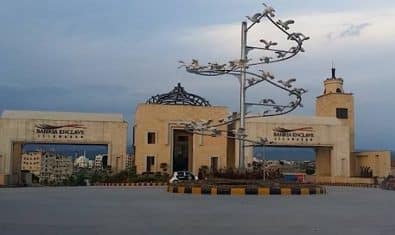Human capital levels in Pakistan are low, and the risks to human capital development begin in early childhood, says the World Bank (WB).
The Bank in its latest report “Risks to Child Development and School Readiness among Children under Six in Pakistan” noted that young children in Pakistan are exposed to a host of risk factors that impede development.
The report noted that Pakistan, the fifth most populous country in the world with 221 million people, has a low Human Capital Index (0.41), indicating that by age 18, a Pakistani child born today can only expect to be 41 percent as productive as she could be if she had access to full education and health.
Many of the risks to development occur in the first 5 years of life when brain development is exceptionally rapid and sensitive. Missed opportunities for nurturing care and stimulation cannot easily be made up later in life. Children in their early years require nurturing that emerges not only from adequate nutrition and healthcare but also from safe environments with engaged caregivers who interact with their young children responsively and provide psychosocial stimulation through everyday activities such as talking and playing.
Access to nurturing and stimulating environments in the early years impacts human development into adulthood.
Across Pakistan, child development before school entry and learning outcomes in school is undermined by widespread geographical, gender, and wealth inequalities. Over 11 million households or 21.9 percent of the population live below the poverty line, and poverty disproportionately affects young children: 27.0 percent of children aged 0-2 years and 29.6 percent of children aged 3-5 years living in poverty, according to calculations using the 2018 Pakistan Social and Living Standards Measurement (PSLM). Among 3- to 4-year-old children living in the lowest income quintile, just 26.0 percent are developing on track.
Two-thirds (62.8 percent) of the population is rural, and Pakistan also has one of the lowest gender parity indices in primary school (girls’ enrollment compared to boys’ enrollment) in the world: 0.88 in Pakistan vs. 0.98 in low- and middle-income countries and 0.99 in South Asia.
Learning poverty, which measures the share of school-age children unable to comprehend a simple text at age 10, is higher in Pakistan (75 percent) than in low- and middle-income countries (53 percent); and the rate is estimated to increase to 79 percent because of COVID-19 setbacks.
In short, too many vulnerable children, including those living in poverty, in rural areas, and with uneducated or distressed parents are at risk of starting life at a disadvantage, which has repercussions throughout the life course. Addressing inequities by supporting child development and school readiness skills, especially among vulnerable populations, is an important step in reducing learning poverty and improving child and human capital outcomes.
Data on the status of early child development (ECD) in Pakistan are incomplete and, in the case of children under 3 years of age, data are largely missing. ECD data are not collected at the country-wide level, are only available for a small subset of children—those aged 3-4 years—and vary by year, province, and indicators, rendering comparisons difficult.
The Early Childhood Development Index (ECDI), the best available measure of child development at scale across provinces, shows substantially lower-than-average scores for children in Pakistan relative to the 75.1 percent average seen across 60 low- and middle-income countries: 59.4 percent in Punjab, 47.5 percent in Sindh, and 54.6 percent in Khyber Pakhtunkhwa.
There are no recent ECDI scores from Balochistan, the poorest province in Pakistan, and except for health surveys that provide proxies for ECD, there are no national ECD data sets for children from birth to age 3.
Smaller-scale or province-specific studies shed light on patterns and rates of parental distress or depression, psychosocial stimulation, participation in ECE, and similar variables of interest, such as integration of parenting and nutrition interventions in community health settings in Sindh and Idara-e-Taleem-o-Aagahi (ITA)-Early Learning Partnership (ELP) studies of ECD during COVID disruptions in Punjab (ITA, 2021). This study aims to broaden the knowledge base by providing nationally representative data.





















